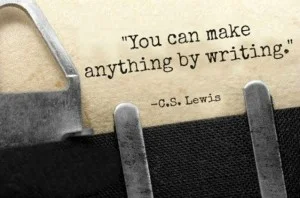Lots of people talk about writing books, but most of those people never do. How do you become one of those writers who breaks through and gets stuff done? Here are a few tips to help:
1. Create a schedule
If you really want to crank out some writing, you should be prepared to make a routine of it. Start by setting yourself a goal. How much do you want to accomplish in a day? Do you want to write for one hour each day? Or do you want to write 500 words per day? Pick something that works for you and stick to it like it’s your job. Also, decide on a place where you’ll do this writing without distractions. Don’t try to work on your living room couch if Netflix or your kids in the next room are going to distract you. Go to that coffee shop you love, sit at your kitchen bar or board yourself up in your office even if it’s only for 15 minutes a day. As writer Jeff Goins says, “Don’t set out to write a book. Set out to become a regular writer.”
2. Set deadlines
Set deadlines big and small to remind yourself that you’re working toward something. Writing (or most projects, really) never gets done without a deadline. So mark those calendars, and work toward those deadlines with diligence.
3. Find your methods
Find the methods and systems that work best for you when it comes to writing. What way do you like to research? Do you brainstorm before you start to write? How do you go about revising? Where do you collect all your ideas and thoughts about future writing? Find the things that work best for you and stick with them!
4. Take a productive break
If you’re stuck in a writing rut, don’t be too hard on yourself. Instead of getting flustered, try going outside and getting some air, and then perhaps read something that isn’t your own writing. Okay, so maybe I stole this tip from author Virginia Woolf, but I think it’s great. She said, “The way to rock oneself back into writing is this. First gentle exercise in the air. Second the reading of good literature. It is a mistake to think that literature can be produced from the raw.”
With just these few tips, you can become a more productive writer. It’s not always easy, but the end result is always worth it!




























